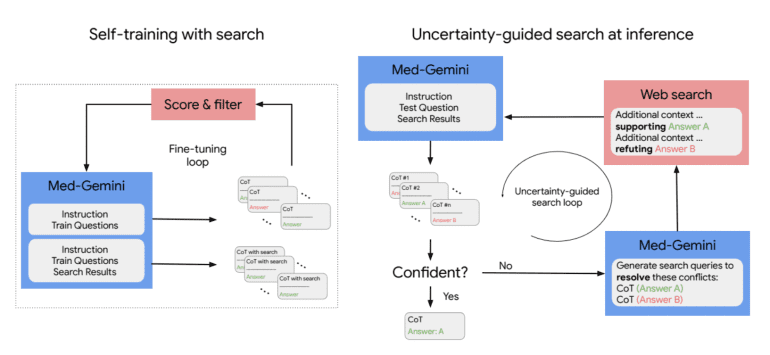- Google and DeepMind unveil Med-Gemini, an AI model for healthcare surpassing GPT-4.
- Med-Gemini boasts superior performance on 14 industry benchmarks, offering factual and nuanced clinical reasoning.
- Key features include enhanced EHR data retrieval, outperforming human capabilities in medical text summarization and referral letter composition.
- Illustrative examples highlight Med-Gemini’s diagnostic accuracy and treatment recommendations.
- Dermatologist feedback praises precision but suggests improvements in requesting additional data and providing differential diagnoses.
- Google emphasizes the need for further refinement before real-world deployment and commits to integrating responsible AI principles.
Main AI News:
In a recent unveiling, Google and DeepMind have shed light on their latest advancements in artificial intelligence tailored for the healthcare sector.
Med-Gemini, currently in its research phase, is an evolution of Google’s Gemini model, boasting superiority over prevailing industry benchmarks across 14 fronts, as per Google’s research team.
Comprising a suite of large multimodal models (LMMs), Med-Gemini serves diverse purposes and applications. While conventional large language models exhibit deficiencies in clinical reasoning amid uncertainty and grapple with biases and hallucinations, Med-Gemini emerges with claims of offering more factual, reliable, and nuanced outcomes for intricate clinical reasoning tasks compared to its competitors, including the esteemed GPT-4, states Google.
Google asserts that Med-Gemini stands as the pinnacle of accuracy among LMMs currently available, achieving a commendable 91.1% accuracy on the widely acknowledged MedQA benchmark. Moreover, these models have even outperformed human capabilities in tasks such as medical text summarization and composing referral letters, with clinicians rating Med-Gemini-M 1.0’s responses as on par with or superior to expert responses half of the time.
Key distinguishing features of Med-Gemini that elevate its standing among existing AI healthcare models include its prowess in tackling complex queries derived from electronic health records (EHRs) through extensive contextual processing and seamless integration with search functionalities.
Google highlights Med-Gemini’s aptitude in tackling “needle in a haystack” scenarios within EHRs, where pertinent medical data often elude conventional algorithms. The research paper illustrates instances where Med-Gemini successfully discerned relevant patient-centric information beyond mere keyword matches, significantly enhancing its utility in clinical settings.
The enhanced EHR retrieval capabilities of Med-Gemini hold promise in alleviating cognitive burdens on clinicians and empowering them with efficient extraction and analysis of vital patient data from extensive datasets, according to the research findings.
Furthermore, Med-Gemini exhibits commendable performance across various medical benchmarks, encompassing medical knowledge, clinical reasoning, genomics, waveforms, medical imaging, health records, and videos, as per the assessments conducted by researchers.
Google underscores Med-Gemini’s performance through illustrative examples. In one scenario, a patient submitted an image of a skin lesion, soliciting Med-Gemini’s assistance in diagnosis. Following a series of inquiries, Med-Gemini provided the patient with a potential diagnosis along with viable treatment options.
Subsequent evaluation by a dermatologist lauded Med-Gemini’s diagnostic accuracy and treatment recommendations. The dermatologist acknowledged the model’s precision in diagnosing prurigo nodularis, a relatively uncommon and specialty-specific condition, based on limited data inputs, while also appreciating the comprehensive therapeutic guidance offered.
However, the dermatologist raised concerns regarding the model’s failure to request additional images, provide a range of potential diagnoses, and convey the lack of a definitive cure while emphasizing the prospects of symptom management through treatment.
Google acknowledges the necessity for further refinement and specialization of its models before their deployment in real-world healthcare settings. At present, these models require extensive research and development before they can be considered for clinical diagnostics.
The research paper underscores Google’s commitment to integrating responsible AI principles into the development process of Med-Gemini. The company emphasizes the importance of embedding principles such as fairness, privacy, equity, transparency, and accountability throughout the model’s evolution, paving the way for responsible and ethically sound AI applications in healthcare.
Conclusion:
Google’s unveiling of Med-Gemini signifies a significant leap in healthcare AI technology, challenging existing benchmarks and setting new standards for accuracy and reliability. The model’s advanced capabilities in clinical reasoning and diagnostic tasks present promising opportunities for improving patient care and streamlining healthcare workflows. However, the emphasis on responsible AI development underscores the importance of ethical considerations in AI application, shaping the future direction of AI integration in healthcare markets.

